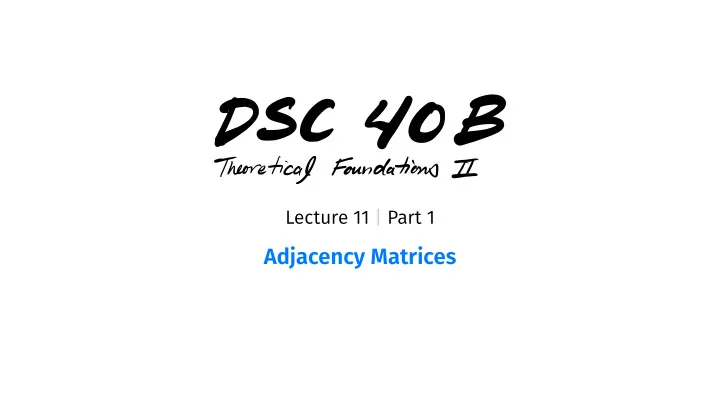

Lecture 11 | Part 1 Adjacency Matrices
Representations memory? 1. Adjacency matrices. 2. Adjacency lists. 3. “Dictionary of sets” ▶ How do we store a graph in a computer’s ▶ Three approaches:
Adjacency Matrices ▶ Assume nodes are numbered 0, 1, …, |𝑊| − 1 ▶ Allocate a |𝑊| × |𝑊| (Numpy) array ▶ Fill array as follows: ▶ arr[i,j] = 1 if (𝑗, 𝑘) ∈ 𝐹 ▶ arr[i,j] = 0 if (𝑗, 𝑘) ∉ 𝐹
Example
Example
Observations ▶ If 𝐻 is undirected, matrix is symmetric. ▶ If 𝐻 is directed, matrix may not be symmetric.
Time Complexity operation code time edge query adj[i,j] == 1 Θ(1) degree( 𝑗 ) np.sum(adj[i,:]) Θ(|𝑊|)
Space Requirements ▶ Uses |𝑊| 2 bits, even if there are very few edges. ▶ But most real-world graphs are sparse . ▶ They contain many fewer edges than possible.
Example: Facebook = 500 petabits ≈ 6500 years of video at 1080p ≈ 60 copies of the internet as it was in 2000 ▶ Facebook has 2 billion users. (2 × 10 9 ) 2 = 4 × 10 18 bits
Adjacency Matrices and Math of length 2 between 𝑗 and 𝑘 . ▶ Adjacency matrices are useful mathematically. ▶ Example: (𝑗, 𝑘) entry of 𝐵 2 gives number of hops
Lecture 11 | Part 2 Adjacency Lists
What’s Wrong with Adjacency Matrices? ▶ Requires Θ(|𝑊| 2 ) storage. ▶ Even if the graph has no edges. ▶ Idea : only store the edges that exist.
Adjacency Lists ▶ Create a list adj containing |𝑊| lists. ▶ adg[i] is list containing the neighbors of node 𝑗 .
Example
Example
Observations ▶ If 𝐻 is undirected, each edge appears twice. ▶ If 𝐻 is directed, each edge appears once.
Time Complexity operation code time edge query j in adj[i] Θ(degree(𝑗)) degree( 𝑗 ) len(adj[i]) Θ(1)
Space Requirements ▶ Need Θ(|𝑊|) space for outer list. ▶ Plus Θ(|𝐹|) space for inner lists. ▶ In total: Θ(|𝑊| + |𝐹|) space.
Example: Facebook friendships. (2 bits × 200 × (2 billion ) = 3.2 terabytes = 0.04 years of HD video ▶ Facebook has 2 billion users, 400 billion ▶ If each edge requires 32 bits: = 64 × 400 × 10 9 bits
Lecture 11 | Part 3 Dictionary of Sets
Tradeofgs ▶ Adjacency matrix: fast edge query, lots of space. ▶ Adjacency list: slower edge query, space effjcient. ▶ Can we have the best of both?
Idea arbitrary labels. ▶ Use hash tables . ▶ Replace inner edge lists by set s. ▶ Replace outer list with dict . ▶ Doesn’t speed things up, but allows nodes to have
Example
Time Complexity operation code time edge query j in adj[i] degree( 𝑗 ) len(adj[i]) Θ(1) average Θ(1) average
Space Requirements ▶ Requires only Θ(𝐹) . ▶ But there is overhead to using hash tables.
Dict-of-sets implementation On datahub: import dsc40graph Or download from the course page.
Recommend
More recommend